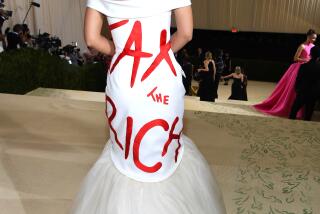Depreciated Value : If Someone Says: ‘Thanks a Million,’ You May Be Facing a Gratitude Deficit
- Share via
THE WORD million has lost the near-magic, hyperbolic value that it once had when we used it to define phenomena almost beyond calculating.
It was enough to say that Henry Ford and John D. Rockefeller were millionaires, though they may indeed have been billionaires.
Today there are probably a million millionaires in the United States. To call a man a mere millionaire no longer identifies him as super-rich. Today’s biggest wheelers and dealers are billionaires--at least.
The power a billionaire has is truly beyond our grasp. His money would buy him almost anything he might want except, perhaps, a sovereign state, youth or beauty.
On the other hand, it might buy him some sovereign states.
Today, baseball players make $2 million a year. Juries hand out multi-million-dollar judgments as if they were confetti. Rock Hudson’s lover is granted $21.7 million from Hudson’s estate because Hudson failed to tell him he had AIDS. Clerks and beauty shop operators win $20 million in the lottery.
We seem to have lost sight of how much money $1 million is.
But Dan Frazier, a correspondent of mine, is determined to keep the true meaning of the word million before our eyes.
Frazier has prepared a book, as yet unpublished, that graphically demonstrates the true meaning of the casual phrase “Thanks a million.”
The book consists of 125 pages on each of which the word Thanks is printed 8,000 times--in 40 columns of 200 words each. The words are too tiny for me to measure on my 12-inch ruler.
By riffling through those 125 pages and seeing the solid banks of Thanks flash by, page after page, you get some idea of what a million is.
The only other enlightenment that the book offers is a few illustrations of what a million means in concrete terms.
For example, a stack of a million $1 bills would be 667 feet high. You would have to circumvent the world 40 times to travel a million miles. If a million people lined up for a movie, that line would be more than 189 miles long. (That figure, of course, would have to be an approximation, depending on how fat or thin the people were.)
If you had a stack of a million records, it would be 10 times taller than the Empire State Building.
If you could travel at a million miles per hour, you could travel from Los Angeles to New York in nine seconds.
If you saved $15,000 a year, it would take you 67 years to save a million dollars.
If a million cars were in a traffic jam on a three-lane freeway, traffic would back up from New York to Miami.
(Let’s not forget. We have at least 3 million cars in Los Angeles--enough potentially to cause a traffic jam from here to New York.)
Less fearsome, perhaps, is the fact that a sheet of a million postage stamps would cover nearly three tennis courts.
A similar fact is that a million inch-thick novels would require 15.9 miles of shelf space.
Frazier is still looking for a publisher (publishers evidently think no one wants to read Thanks a million times). But if you want to say “Thanks a million” to someone, you may buy a privately printed copy for $14, which can be sent to Frazier at 5611 Carlton Way, No. 402, Hollywood 90028.
Meanwhile, as we tread anxiously into a world where billion has replaced million, and trillion has overtaken billion at least in terms of our national debt, we may, with trepidation, try to calculate what those terms really mean.
A billion is a thousand times a million, and a trillion is a thousand times a billion. To grasp the meaning of these numbers, take each of Frazier’s illustrations and multiply it a thousand times.
Thus, if you could save a million dollars by saving $15,000 every year for 67 years, it would take you 67,000 years to save a billion, and 67,000,000 years to save a trillion.
And if you personally wanted to pay off the national debt, at about $15,000 a year, it would take you about 134,000,000 years.
Those calculations are my own, and if they are off by $100 million or so, excuse me.
I can’t even remember what 9 times 6 is.
Prop money courtesy of Mari Blackwell
More to Read
Inside the business of entertainment
The Wide Shot brings you news, analysis and insights on everything from streaming wars to production — and what it all means for the future.
You may occasionally receive promotional content from the Los Angeles Times.








